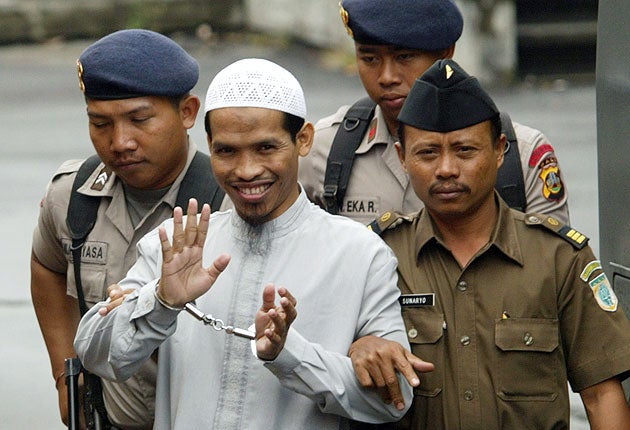Your support helps us to tell the story
From reproductive rights to climate change to Big Tech, The Independent is on the ground when the story is developing. Whether it's investigating the financials of Elon Musk's pro-Trump PAC or producing our latest documentary, 'The A Word', which shines a light on the American women fighting for reproductive rights, we know how important it is to parse out the facts from the messaging.
At such a critical moment in US history, we need reporters on the ground. Your donation allows us to keep sending journalists to speak to both sides of the story.
The Independent is trusted by Americans across the entire political spectrum. And unlike many other quality news outlets, we choose not to lock Americans out of our reporting and analysis with paywalls. We believe quality journalism should be available to everyone, paid for by those who can afford it.
Your support makes all the difference.Indonesia will execute the Bali bombers on death row in early November, the spokesman of the Indonesian attorney general's office said today.
The three men - Imam Samudra, Amrozi and Mukhlas, also known as Ali Ghufron - were sentenced to death in 2003 for their roles in the 2002 Bali nightclub bombings that killed 202 people.
The attacks by the south-east Asian militant group Jemaah Islamiah (JI) were intended to scare away foreigners as part of their drive to make Indonesia, the world's most populous Muslim nation, part of a larger Islamic caliphate.
"The Indonesian attorney general office decided that the plan to execute Amrozi, Imam Samudra and Ali Gufron will be conducted in early November 2008,"Jasman Pandjaitan, spokesman for the attorney general's office, told reporters.
The men are currently held in a maximum security prison island, Nusakambangan, where officials said the executions will take place.
The three, who were convicted for playing key roles in the bombings, have refused to seek clemency from Indonesian President Susilo Bambang Yudhoyono after the Supreme Court rejected their final appeals, saying they want to die as martyrs.
In an interview with Reuters late last year, the militants said they had no regrets, except for the fact that some Muslims had died in the blasts.
The two blasts on Bali's Kuta strip on 12 October, 2002 - one at Paddy's Bar and the other at the Sari Club - killed 202 people including 88 Australians and 38 Indonesian citizens, and dealt a severe blow to the island's tourist industry.
In an earlier statement from their lawyers, the men said their blood would "become the light for the faithful ones and burning hell fire for the infidels and hypocrites".
Instead of pushing Indonesia to cut ties with countries such as the United States and Australia, the attacks seem to have deepened them.
The Bali bombings and other attacks in the resort island and the capital Jakarta helped push Indonesia into a closer security relationship with Washington and Canberra as the government sought help in tackling Islamic militants.
Although there have been no major bomb attacks since 2005, Indonesia is still considered at risk. In his annual address to parliament on 15 August, President Yudhoyono warned that the "country is still unsafe from terrorist acts".
The Indonesian anti-terrorist unit, Detachment 88, was involved in a series of raids last year that authorities say netted the heads of JI and its military wing.
Raids in July also detained 10 suspected militants in Sumatra and a large cache of bombs.
Police are still seeking Noordin Top, a Malaysian considered a key figure behind a series of bombings, including a second set of blasts in Bali in 2005 that killed more than 20 people. Some analysts say Top might have set up a splinter group.
Some other top JI figures are also believed to be in the southern Philippines, including Umar Patek and Dulmatin, suspects in the 2002 Bali bombs.

Join our commenting forum
Join thought-provoking conversations, follow other Independent readers and see their replies
Comments